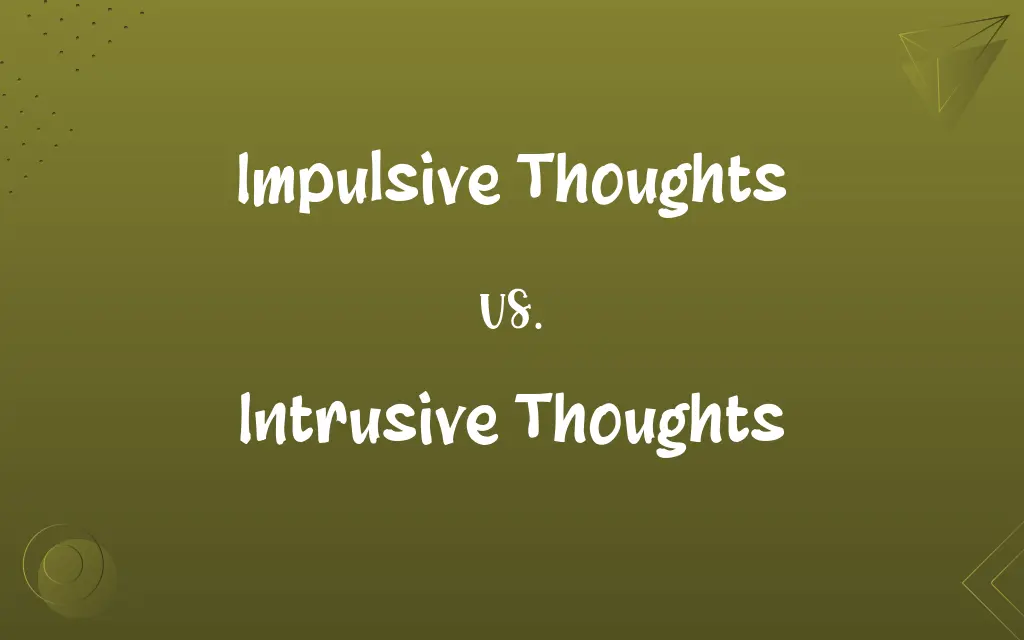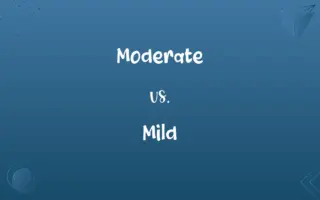Impulsive Thoughts vs. Intrusive Thoughts: Know the Difference

By Shumaila Saeed & Hifza Nasir || Published on October 18, 2024
Impulsive thoughts are sudden urges to act for immediate gratification, while intrusive thoughts are unwanted, distressing ideas entering one's mind involuntarily.

Key Differences
Impulsive thoughts are closely tied to impulsivity, reflecting a lack of deliberation and an inclination towards spontaneous decisions or actions, sometimes despite potential negative consequences. These thoughts can range from benign impulses, like making an unplanned purchase, to more harmful urges. Intrusive thoughts, however, are involuntary and often unwanted thoughts, images, or ideas that can cause significant anxiety or discomfort. They are not necessarily linked to an individual's intentions or desires and do not imply any intention to act on them.
Hifza Nasir
Oct 18, 2024
Individuals experiencing impulsive thoughts might act on these urges, seeking immediate satisfaction or relief from internal tension. In contrast, those with intrusive thoughts typically do not want these thoughts and may go to great lengths to avoid or suppress them, as they can be disturbing or contrary to one’s values or self-image.
Shumaila Saeed
Oct 18, 2024
Impulsive thoughts can be a normal part of everyday decision-making but can also signify underlying issues like ADHD or impulse control disorders when they lead to dysfunctional or harmful behaviors. Intrusive thoughts are common among the general population but are particularly prevalent and distressing in conditions such as OCD (Obsessive-Compulsive Disorder), where they can trigger compulsions as a form of coping mechanism.
Hifza Nasir
Oct 18, 2024
The management of impulsive thoughts often involves strategies to improve self-control, mindfulness, and decision-making skills, aiming to increase awareness of the consequences of actions and to develop healthier response patterns. Managing intrusive thoughts may include therapeutic approaches such as Cognitive Behavioral Therapy (CBT) or Exposure and Response Prevention (ERP), focusing on reducing the distress they cause and changing how one responds to these thoughts.
Shumaila Saeed
Oct 18, 2024
Both impulsive and intrusive thoughts can impact mental health and quality of life, their differences lie in the nature of the thoughts, the emotional response they elicit, and the strategies used for management. Understanding these differences is crucial for addressing them effectively in therapeutic settings or personal coping strategies.
Hifza Nasir
Oct 18, 2024
ADVERTISEMENT
Comparison Chart
Nature
Urges to act quickly without thinking.
Unwanted, distressing thoughts or images.
Hifza Nasir
Oct 18, 2024
Relation to Action
Often lead to immediate action.
Do not imply a desire to act on them.
Shumaila Saeed
Oct 18, 2024
Emotional Response
Driven by desire for gratification or relief.
Cause anxiety or discomfort.
Shumaila Saeed
Oct 18, 2024
Commonality
Can be a part of normal behavior or indicate a disorder.
Common, especially in OCD and anxiety disorders.
Shumaila Saeed
Oct 18, 2024
Management
Focuses on improving self-control and mindfulness.
Includes therapy to reduce distress and alter response.
Hifza Nasir
Oct 18, 2024
ADVERTISEMENT
Impulsive Thoughts and Intrusive Thoughts Definitions
Impulsive Thoughts
Reflects immediate decision-making.
Deciding to quit a job suddenly out of frustration.
Shumaila Saeed
Feb 27, 2024
Intrusive Thoughts
Managed through therapeutic strategies.
Using ERP to reduce the power of intrusive thoughts about accidents.
Dua Fatima
Feb 27, 2024
Impulsive Thoughts
Sudden urges to act without consideration of consequences.
The impulsive thought to buy something expensive on a whim.
Hifza Nasir
Feb 27, 2024
Intrusive Thoughts
Unwanted thoughts that cause distress.
Recurring worries about getting sick despite no evidence.
Hifza Nasir
Feb 27, 2024
Impulsive Thoughts
Can lead to spontaneous, sometimes regrettable actions.
The urge to send an angry email without thinking it through.
Hifza Nasir
Feb 27, 2024
ADVERTISEMENT
Intrusive Thoughts
Can be violent or disturbing images.
Sudden mental images of harming a loved one.
Shumaila Saeed
Feb 27, 2024
Impulsive Thoughts
May indicate underlying behavioral issues.
Impulsive gambling or shopping sprees.
Hifza Nasir
Feb 27, 2024
Intrusive Thoughts
Trigger anxiety and compulsive behaviors in OCD.
Obsessive fears of contamination leading to excessive handwashing.
Shumaila Saeed
Feb 27, 2024
Impulsive Thoughts
Associated with seeking instant gratification.
Eating junk food impulsively when on a diet.
Shumaila Saeed
Feb 27, 2024
Intrusive Thoughts
Often contrary to one’s values.
Blasphemous thoughts in a religious individual.
Hifza Nasir
Feb 27, 2024
Repeatedly Asked Queries
Are intrusive thoughts a sign of a mental disorder?
While intrusive thoughts can occur in anyone, frequent and highly distressing intrusive thoughts are a characteristic feature of certain disorders like OCD.
Hifza Nasir
Oct 18, 2024
Are impulsive thoughts always negative?
Not necessarily; impulsive thoughts can range from benign or trivial to potentially harmful, depending on their nature and the actions they prompt.
Shumaila Saeed
Oct 18, 2024
How can someone differentiate between impulsive and intrusive thoughts?
Impulsive thoughts are characterized by the urge to act, driven by immediate gratification, whereas intrusive thoughts are unwanted and cause distress without an accompanying desire to act on them.
Hifza Nasir
Oct 18, 2024
Do people act on intrusive thoughts?
Generally, people do not act on intrusive thoughts, as these thoughts are unwanted and distressing, not reflective of desires or intentions.
Shumaila Saeed
Oct 18, 2024
Is it normal to experience both impulsive and intrusive thoughts?
Yes, it's normal to experience both types of thoughts to some degree, but persistent issues may require attention and management.
Hifza Nasir
Oct 18, 2024
Can impulsive thoughts be controlled?
Yes, with strategies like mindfulness, therapy, and sometimes medication, individuals can learn to control or reduce their impulsive thoughts.
Shumaila Saeed
Oct 18, 2024
What should I do if I have intrusive thoughts?
Acknowledge the thoughts without judgment and consider seeking professional help, especially if they significantly impact your well-being or daily functioning.
Hifza Nasir
Oct 18, 2024
Can impulsive thoughts lead to positive outcomes?
Sometimes, impulsive thoughts can lead to positive actions, such as spontaneous acts of kindness or creative breakthroughs, depending on how they're acted upon.
Shumaila Saeed
Oct 18, 2024
Why do intrusive thoughts feel so real and urgent?
Intrusive thoughts can feel real and urgent due to the anxiety they provoke, making the brain perceive them as immediate threats, despite their lack of basis in reality.
Dua Fatima
Oct 18, 2024
Can children have intrusive thoughts, and how can they be supported?
Yes, children can experience intrusive thoughts. Support includes reassuring them that these thoughts are normal and not their fault, and seeking help from a child psychologist for coping strategies.
Hifza Nasir
Oct 18, 2024
How do I stop acting on impulsive thoughts?
Strategies include pausing before acting, considering the consequences, practicing mindfulness, and seeking support from therapy or counseling to manage underlying issues.
Hifza Nasir
Oct 18, 2024
Share this page
Link for your blog / website
HTML
Link to share via messenger
About Author
Written by
Shumaila SaeedShumaila Saeed, an expert content creator with 6 years of experience, specializes in distilling complex topics into easily digestible comparisons, shining a light on the nuances that both inform and educate readers with clarity and accuracy.
Co-written by
Hifza Nasir






























































